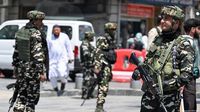In a significant escalation of tensions between India and Pakistan, UN Secretary-General Antonio Guterres conducted separate telephone conversations on April 29, 2025, with Indian Foreign Minister Subrahmanyam Jaishankar and Pakistani Prime Minister Muhammad Shahbaz Sharif. These discussions primarily focused on the deteriorating situation in Jammu and Kashmir following a terrorist attack on April 22 that claimed at least 28 lives.
Guterres condemned the attack, which was carried out by militants from the Kashmir Resistance group, and called for accountability for those responsible. He expressed grave concern over the rising tensions between the two nuclear-armed neighbors, emphasizing that such confrontations could lead to tragic consequences. The Secretary-General offered his good offices to facilitate de-escalation efforts, highlighting the urgent need for dialogue.
In response to the attack in Kashmir, Indian Prime Minister Narendra Modi held a high-level security meeting where he granted the armed forces "full operational freedom" to respond decisively. Modi declared, "Our national resolve is to deliver a crushing blow to terrorism," showcasing a strong stance against the militants. This meeting included key figures such as Defense Minister Rajnath Singh and Chief of Staff of the Indian Armed Forces Anil Chauhan, who discussed possible military actions.
Modi’s statements come amid escalating threats from Pakistani Defense Minister Khawaja Asif, who warned that an Indian invasion was imminent and could occur within days. He also indicated that Pakistan was prepared to respond, including the potential use of nuclear weapons if faced with a direct threat.
Relations between India and Pakistan have sharply deteriorated since the April 22 attack, which saw militants open fire on tourists in the Baisaran Valley, resulting in 26 fatalities. Following this incident, India identified two suspects as Pakistani nationals, further straining diplomatic relations. Pakistan has vehemently denied any involvement and has called for an impartial investigation.
In a series of retaliatory measures, India announced the cancellation of visas issued to Pakistani citizens as of April 27. Pakistan responded by invalidating visas for Indian nationals, closing its airspace to Indian airlines, and halting trade with India. Additionally, India suspended the Indus Waters Treaty of 1960, which governs the distribution of water from the Indus River, a critical resource for both nations. In response, Pakistan's National Security Council stated that any attempts to alter water flow would be viewed as an act of war.
As tensions escalate, ordinary citizens in Karachi have expressed deep concern regarding the potential for conflict. Many are wary of the historical pattern of violence in Kashmir, which has often led to military confrontations between India and Pakistan. Despite the heightened rhetoric, some analysts believe that a full-scale war is unlikely due to the nuclear capabilities of both nations, which serve as a significant deterrent.
Imtiaz Gul, Executive Director of the Islamabad Center for Research and Security Problems, remarked, "I think that a total war between India and Pakistan is impossible. The nuclear potential of both countries serves as a major deterrent to a full-scale confrontation." However, he acknowledged that the current escalation is troubling.
In the wake of the attack, India has taken several drastic steps against Pakistan, including the severance of diplomatic ties and the closure of borders. The question of whether India will launch a military strike remains uncertain. In 2019, a suicide bombing in Pulwama killed 40 Indian soldiers, prompting India to conduct airstrikes against Pakistan, bringing the two nations to the brink of war. Analysts suggest that Modi's government is under immense pressure to respond militarily to maintain its image and quell public expectations.
Pravin Dhonti, a senior analyst at the International Crisis Group, noted that the government’s aggressive rhetoric has shaped public expectations for a decisive military response. He stated, "This government pays great attention to its image in the eyes of the public and, most likely, will be forced to carry out a military operation that should look more significant than the air strikes of 2019 to appease its supporters."
Conversely, Maliha Lodhi, a former Pakistani ambassador to the United States, warned that any military action from India would provoke a strong response from Islamabad, potentially leading to unpredictable and dire consequences. She emphasized the risks associated with the notion of limited warfare under nuclear deterrence, urging that such a scenario be avoided at all costs.
As the situation unfolds, analysts are closely monitoring the potential for further military actions. Said Ata Hasnain, a former Indian general, advised that any retaliatory measures should not be time-bound but rather executed when success is assured. He urged the Indian public to trust their political and military leadership during this precarious time.
While diplomatic relations remain frozen, the conflict over Kashmir continues to threaten regional stability. Analysts predict that India will persist in applying pressure on Pakistan, using its international influence to isolate Islamabad. Gul noted, "India is trying to isolate Pakistan. One way out of the water agreement with India is a big threat to the country," highlighting the severe implications for Pakistan’s economy, which is already in crisis.
As both nations grapple with the fallout from this latest incident, the international community has called for restraint. The UN has urged both sides to engage in constructive dialogue to resolve their differences peacefully. Similarly, China has appealed for both countries to exercise restraint and work towards a resolution through dialogue.
In the United States, President Donald Trump has refrained from taking sides, acknowledging the long-standing tensions in the region. He stated, "There have been tens of thousands of soldiers on that border (of Kashmir) for years, there is tension. It has always been so, but I believe that they will either get along or otherwise break up. I know both leaders (India and Pakistan)."
As the global diplomatic landscape becomes increasingly complex, the U.S. is expected to advocate for diplomatic solutions to de-escalate tensions and prevent further violence, recognizing that the resolution of this conflict could significantly impact regional and global security dynamics.





